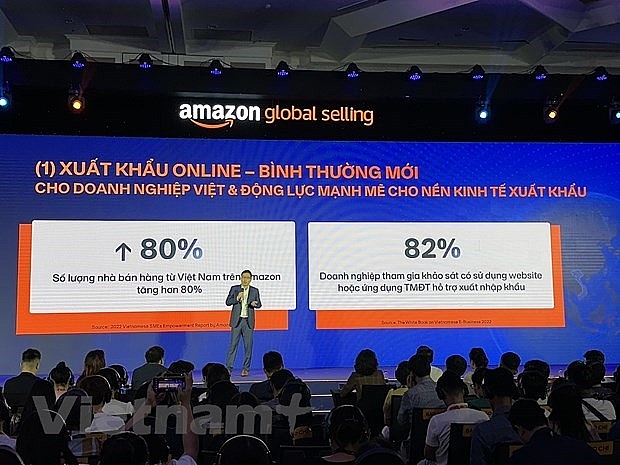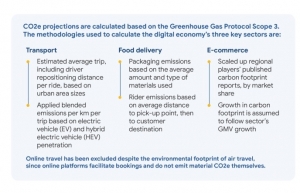E-commerce boosted to fuel sale of Vietnamese goods
 |
| A representative of Amazon gives advice on trading via e-commerce to businesses. (Photo: VietnamPlus) |
Hanoi – Businesses are making use of e-commerce to cut down selling expenses, expand the markets, and improve their competitiveness to boost the sale of Vietnamese goods amid global economic integration
Highly potential field
Each month, the Hanoi-based company of Hoang Trung supplies tens of tonnes of farm produce from nationwide for the market. Instead of using traditional channels, it has stepped up sale via social media like Facebook, Zalo or some e-marketplaces, and harvested encouraging results.
He said that during more than two years of the COVID-19 pandemic (2019 - 2021), his firm faced numerous difficulties because of anti-pandemic measures like social distancing.
Therefore, to boost sale and save expenses, it has increased selling produce online and been able to access buyers even in faraway places.
Thanks to e-commerce, his company’s revenue has risen two- or three-fold while the money previously spent on renting shops or hiring employees is now used to improve service quality, Trung added.
Le Van Tong, head on the online marketing division of the Ho Chi Minh City Union of Trading Cooperatives (Saigon Co.op), said the number of online buyers of his business’s products is 2.4 per cent higher than those directly purchasing at outlets or supermarkets. This is a demonstration of e-commerce’s attractiveness to consumers.
About 70 per cent of the Vietnamese population have accessed the internet and the majority are young people, which is great potential for e-commerce development, he emphasised.
Tran Dinh Toan, Deputy General Director of the OSB Investment and Technology JSC – an authorised dealer of the Alibaba group in Vietnam, held that the changes of the digital economy and shopping behaviours during and after the COVID-19 pandemic, along with the country’s participation in international trade agreements, have given a boost to e-commerce in Vietnam.
Only the internet can create trading platforms for millions of businesses, billions of products, and a huge volume of customers. A number of companies have seen revenue surges of 70 - 80 per cent thanks to their engagement in international e-marketplaces, he added.
Competitiveness promoted
The e-commerce market is expanding with the presence of more stakeholders and more modern supply chains, driven by digitalisation and information technology.
In particular, this market has become even more vibrant amid the pandemic. Applying digital technology to create new distribution channels has proved useful for Vietnamese businesses to surmount headwinds and seize opportunities from changed shopping behaviours of consumers.
According to a recent report on Southeast Asian economies, the internet economy of Vietnam posted the fastest growth in the region, from 18 billion USD in 2021 to 23 billion USD in 2022, including 14 billion USD from e-commerce. The country’s internet economy is forecast to reach 49 billion USD by 2025, including 32 billion USD from e-commerce.
Nguyen Thi Minh Huyen, Deputy Director of the Vietnam E-Commerce and Digital Economy Agency (iDEA) at the Ministry of Industry and Trade, said that in the post-pandemic period, e-commerce is establishing itself as one of the leading areas of the digital economy, creating momentum of economic development, and encouraging digital transformation in businesses.
Paying great attention to e-commerce, ministries, sectors, and localities have carried out a number of programmes and measures to bolster the sale and export of Vietnamese goods via the internet. As a result, many strong products of Vietnam like processed food, handicrafts, and consumer goods have reached consumers in many countries around the world.
However, to further develop e-commerce, economists recommended companies thoroughly learn about markets, consumption trends, and business feasibility to select suitable and potential niche markets to focus on, ensure product quality, and comply with standards and legal regulations of target markets.
 | E-commerce competition: a story of past and future E-commerce investment activities in Vietnam can be divided into three main phases. In the first phase, Vietnam’s e-commerce industry started from the mid-2000s to 2010 with early generations of e-commerce platforms such as Vat Gia, En Bac, Cho Dien Tu, and 123mua.vn. |
 | Tiki battles to keep up with financially muscular rivals Amid the resignation of Tiki’s co-founder, Vietnam’s e-commerce landscape faces a challenging period underscored by intense competition, performance challenges, and the pressing need for a strategic overhaul. |
 | TikTok Shop dethrones Lazada in Vietnam's e-commerce sector Having launched just last year, TikTok Shop has rapidly ascended the ranks in Vietnam's e-commerce sector, dethroning Lazada from its position as the second-largest platform by revenue, according to the latest data from market analyst firm, Metric. |
 | E-commerce groups engage in effective green strategies Although Vietnam’s e-commerce has recorded remarkable growth in recent years, related businesses are scrambling to improve sustainability due to a lack of suitable regulations. |
What the stars mean:
★ Poor ★ ★ Promising ★★★ Good ★★★★ Very good ★★★★★ Exceptional
 Tag:
Tag:
Related Contents
Latest News
More News
- Ho Chi Minh City launches plan for innovation and digital transformation (February 25, 2026 | 09:00)
- Vietnam sets ambitious dairy growth targets (February 24, 2026 | 18:00)
- Masan Consumer names new deputy CEO to drive foods and beverages growth (February 23, 2026 | 20:52)
- Myriad risks ahead, but ones Vietnam can confront (February 20, 2026 | 15:02)
- Vietnam making the leap into AI and semiconductors (February 20, 2026 | 09:37)
- Funding must be activated for semiconductor success (February 20, 2026 | 09:20)
- Resilience as new benchmark for smarter infrastructure (February 19, 2026 | 20:35)
- A golden time to shine within ASEAN (February 19, 2026 | 20:22)
- Vietnam’s pivotal year for advancing sustainability (February 19, 2026 | 08:44)
- Strengthening the core role of industry and trade (February 19, 2026 | 08:35)





















 Mobile Version
Mobile Version